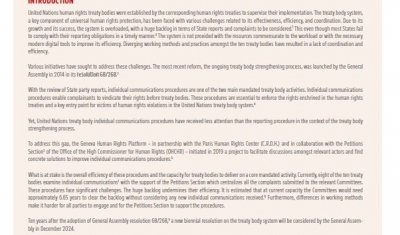Xenophobia and its Impact on Human Rights in Migration: Launching of the CERD-CMW Joint General Comment/Recommendation Consultation Phase
Event


Pixabay
This side event to the 57th session of the UN Human Rights Council is co-organized by the Committee on the Elimination of Racial Discrimination (CERD) and the Committee on Migrant Workers (CMW), in partnership with the Graduate Institute's Global Migration Centre, The Geneva Human Rights Platform of the Geneva Academy, the UN Office of the High Commissioner for Human Rights, and the Friedrich Ebert Foundation. Additionally, this event is co-sponsored by UN Women, and the Permanent Missions of Australia, Colombia, and Mexico.
It will provide an overview of the process leading to the CERD-CMW joint general recommendation/comment on the eradication of xenophobia and its impact on the rights of migrants. The event will also reflect on the broad political consensus and support to this process.
CERD and CMW are currently developing a joint general recommendation/comment (GR/GC) on comprehensive public policies for addressing and eradicating xenophobia and its impact on the rights of migrants, their families and other non-nationals (or perceived as such) affected by racial and all intersecting grounds of discrimination.
This important joint initiative of the two UN Committees aims to adopt "authoritative guidance" for States parties, based on the Committees' normative mandate within International Human Rights Law. The GR/GC will be directed to guide public policies for comprehensively addressing one of the more pressing challenges in a world where human mobility has become a structural, multidimensional phenomenon that is increasingly shaping societies and communities.
The Concept Note and Questionnaire prepared by the Committees and all submissions received during the first consultative phase can be found here. The second consultative phase will be carried out from September to November 2024, through global, regional and thematic expert consultations.
Moderators
- Pablo Ceriani Cernadas, Vice Chair, Committee on Migrant Workers
- Ibrahima Guissé, Member of the Committee on the Elimination of Racial Discrimination
Panelists
- H.E. Omar Zniber, President of the UN Human Rights Council, and Permanent Representative of the Kingdom of Morocco to the UN in Geneva
- H.E. Emily Roper, Deputy Permanent Representative of Australia to the UN in Geneva
- H.E. Fernando Israel Espinosa Olivera, Deputy Permanent Representative of Mexico to the UN in Geneva
- Adriana Quinones, Head of Human Rights and Development, UN Women Geneva
- Benyam Mezmur, Member of the UN Committee on the Rights of the Child
- Stéphane Jaquemet, COO and Director of Policy, International Catholic Migration Commission
- Professor Vincent Chetail, Director of the Global Migration Centre, Geneva Graduate Institute












